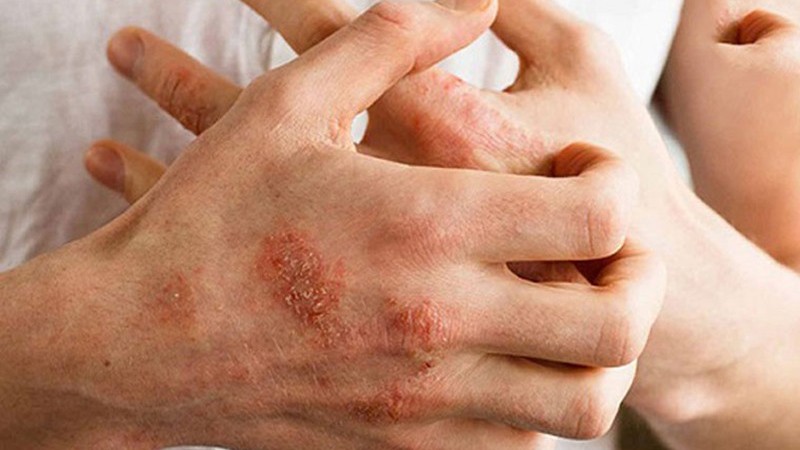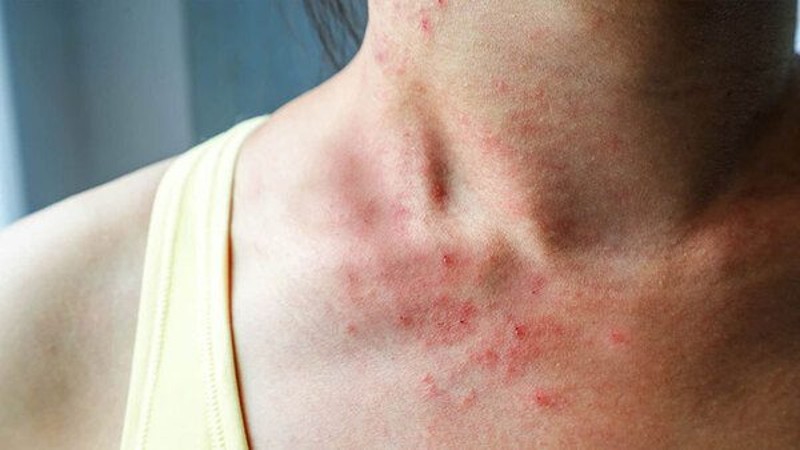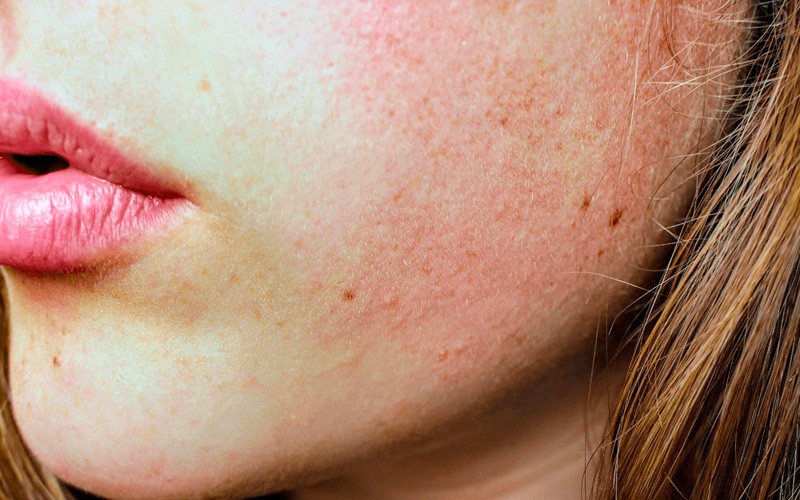Allergic to weather changes is a common condition during seasonal transitions, affecting many people’s health and daily life. So what are the symptoms of weather allergies, and how can we effectively prevent them? Let’s find out in the article below!
1. Understanding Weather Allergies
What is a weather allergy?
Weather allergies occur when our bodies react to seasonal changes, primarily due to temperature and humidity fluctuations that impact the growth and mutation of allergy-causing molds. Disruptions in our immune system are the primary cause of these seasonal allergies.
Weather allergies arise when our bodies come into contact with environmental changes. Reactions to seasonal allergens vary among individuals and can differ based on the severity of allergies. Allergies tend to worsen during hot seasons as sweating increases, leading to constant skin dampness and inflammation.
Causes, Signs, and Symptoms
Causes
The primary cause of weather allergies is abrupt changes in temperature, either too hot or too cold, which our bodies struggle to adapt to, impacting our immune system. This leads to various disorders, and weather allergies are most prevalent during seasonal transitions.
 What is a weather allergy?
What is a weather allergy?
Weather allergies can occur at any time of the year and are typically classified into hot weather allergies and cold weather allergies.
Another contributing factor is air pollution, including smoke, dust, acids, and bacteria, which the first rains of the season carry to the ground. If you happen to be caught in these rains, your skin is more likely to experience allergic reactions.
Signs
A telltale sign of weather allergies is that your skin becomes damp due to excessive sweating on hot days or dry and rough due to dehydration on cold days when temperatures drop below 20°C. As a result, your body may exhibit allergic reactions such as swelling, itching, hives, and redness.
 Weather allergies can cause swelling, itching, hives, and redness.
Weather allergies can cause swelling, itching, hives, and redness.
Symptoms
- Red, itchy skin upon sudden exposure to hot or cold temperatures. The itching reflexively leads to scratching, which further aggravates the allergic reaction.
- Skin blisters and swelling, potentially progressing to redness if left untreated.
- Acute hives all over the body. If accompanied by symptoms like dizziness, shortness of breath, rapid hypotension, or anaphylaxis, seek immediate medical attention, as it can be life-threatening.
- Respiratory symptoms such as a runny nose, sneezing, coughing, headaches, fatigue, and discomfort.
Prone Individuals and Affected Body Parts
While anyone can develop weather allergies, those with a history of allergies (e.g., drug allergies, pollen allergies) or conditions like allergic rhinitis, contact dermatitis, or asthma are more susceptible.
The body parts most vulnerable to weather allergies are exposed areas like the hands, feet, face, and neck.
 Weather allergies commonly affect exposed areas like the hands, feet, face, and neck.
Weather allergies commonly affect exposed areas like the hands, feet, face, and neck.
Are Weather Allergies Dangerous?
Weather allergies are characterized by symptoms such as seasonal allergies, rashes, and hay fever. Seasonal allergies can be further categorized into acute and chronic forms.
- The acute phase lasts from 24 hours to less than six weeks and is marked by itching and discomfort.
- If left untreated or improperly managed, these symptoms can progress to the chronic phase, leading to edema, skin infections, hypotension, and severe allergies.
2. Food Restrictions for Weather Allergies
 What food restrictions should be followed when dealing with weather allergies?
What food restrictions should be followed when dealing with weather allergies?
According to Master’s Degree Doctor Dang Huy Toan from Vinmec International General Hospital in Nha Trang, for a swift and safe recovery from weather allergies, patients should refrain from the following:
- Spicy and greasy foods, fermented products, seafood, eggs, and red meat, as they can trigger skin irritation and exacerbate the redness and itching caused by weather allergies.
- Alcoholic beverages like wine and beer, as well as stimulants, can hinder immune system function and interfere with allergy treatment.
- Exposure to wind or cold water can aggravate sensitive skin affected by weather allergies. Wind and cold water can cause the inflammation and redness to spread, leading to unbearable itching.
- Avoid self-medicating or overusing anti-allergy drugs or creams without medical guidance. Incorrect dosage or application can worsen the allergic reaction.
- Loose-fitting clothing is recommended to prevent skin abrasion and potential infection.
Let’s explore the recommended diet to prevent a worsening of symptoms.
3. Treatment and Prevention of Weather Allergies
Treating Weather Allergy Dermatitis
For mild cases of weather allergy dermatitis, individuals can apply moisturizing creams containing , , or to affected areas to soothe, reduce swelling, and relieve itching.
Additionally, oral antihistamines like , , , … can be used to alleviate itching and hives.
 Treating weather allergy dermatitis
Treating weather allergy dermatitis
For more severe cases, it is advisable to consult a medical professional for a proper diagnosis and prescription medication.
Commonly prescribed medications for weather allergies include:
- Antihistamines like cetirizine and loratadine for typical weather allergies.
- H2 receptor antagonists like cimetidine or doxepin in combination with antihistamines for severe cases of hives.
- Prednisolone indicated for the treatment of angioedema and hives.
- Corticosteroids to manage and prevent the progression of the disease.
Preventing Weather Allergies
 Measures to prevent weather allergies
Measures to prevent weather allergies
To prevent and manage weather allergies, consider the following strategies:
- Boost your immune system by consuming vitamins found in , , and drinking at least 2 liters of water daily.
- Limit alcoholic beverages and minimize exposure to smoke, dust, and pollen.
- Stay warm during cold weather and cool during hot weather.
- Engage in regular physical exercise to maintain overall health.
- Avoid prolonged exposure to harsh sunlight or frigid temperatures.
- Keep a stock of anti-allergy medications to take at the first sign of mild symptoms.
5. Frequently Asked Questions about Weather Allergies
What should I do if I have a weather allergy?
Individuals with weather allergies should refrain from certain foods and avoid wind exposure. They should also avoid self-medicating and instead focus on maintaining a balanced diet and adequate rest to support the treatment process. If these measures prove ineffective, consult a healthcare professional for a proper diagnosis and treatment.
Are weather allergies contagious?
No, weather allergies are non-contagious and affect both genders equally.
 Frequently asked questions about weather allergies
Frequently asked questions about weather allergies
How long do weather allergies last?
In mild cases, weather allergies can subside within 1-2 days with proper care. However, for severe and prolonged cases with extensive lesions, the recovery period may extend to 1-2 weeks.
What should I do if I have a weather allergy rash on my face?
For facial weather allergy rashes, individuals can apply topical medications to alleviate redness and itching. Additionally, increase water intake to hydrate the skin and consume foods rich in to reduce skin inflammation caused by allergies.
We hope this article has provided you with a comprehensive understanding of weather allergy symptoms and effective prevention methods to safeguard your health and that of your loved ones.
Source: Vinmec
Analyzing Distinctions Between Covid-19 and Seasonal Flu Respiratory Illnesses
Have you been feeling under the weather lately? It might be difficult to tell whether it’s Covid-19 or flu symptoms you are experiencing. Fortunately, there are a few identifying factors that can help us differentiate between these illnesses. In this article, we’ll discuss the key differences between Covid-19 and seasonal flu.





































